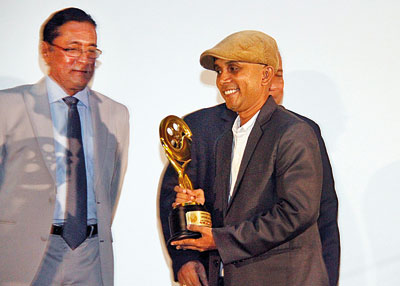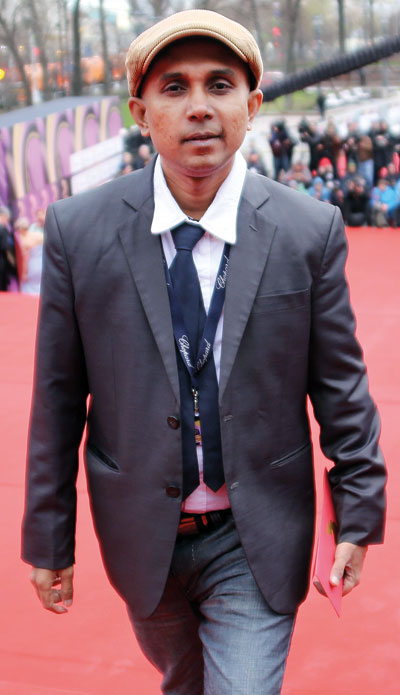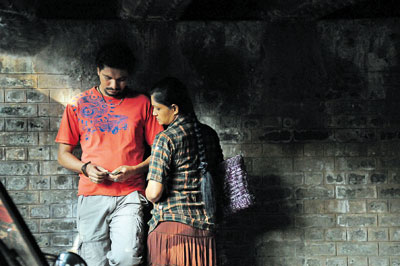Malaka’s debut ‘Undecided’ wins accolades
View(s):Young filmmaker Malaka Devapriya’s debut feature film “Bahuchithawadiya” (The Undecided) won Special jury award for Best Direction and Best Sound Design at the recently held 8th SAARC Film Festival 2018 . The film screened at the NETPAC (Network for the Promotion of Asia Pacific Cinema) section of the prestigious 40th Moscow International Film festival 2018. Last year at Derana Film awards ‘The Undecided’ won Best Film award at cinema of tomorrow 2017.

Malaka with the SAARC Film Festival award
Q:What does the film’s title in Sinhala ‘Bahuchithawadiya’ mean?
The term ‘Bahuchithawadiya’ is not some deep or complicated jargon. ‘Bahu’ means multiple. ‘Chitha’ means thoughts. Therefore, ‘Bahuchithawadiya’ simply means ‘one in many minds’ or ‘one who lacks single-mindedness’. In other words ‘an undecided mind’ (hence the English title ‘The Undecided’). Language is a human construction. The term ‘Bahuchithawadiya’ was coined to denote the nature of our youth in contemporary society. The film ‘Bahuchithawadiya’ was created to express this condition. As you know, in the 60s and 70s Sri Lanka had a closed economy. The ideology of the Left grounded in materialism and it is called in Sinhala ‘Bauthikawadaya’. It shaped and disciplined the world view of a majority of youth belonging to that era. The art work created during that period is also a representation of this. Through his ‘left bank cinema’ Dharmasena Pathiraja captured and brought to the screen, the nature of this youth. His film ‘Para dige’ (On the Run) is an excellent example. But in contemporary Sri Lanka society, capitalism and lumpenism have created new dynamics that alter the nature of youth, in ways contrary to materialism. With the advent of cultural capitalism facilitated by technological globalization and the smart phones, laptops, luxury vehicles and homes it has brought,
Q: How was the experience at the Moscow International Film Festival?

Malaka at the Moscow Film Festival
Dr Dharmasena Pathiraja was the first person to plant the idea of the Moscow International Festival in me when I was studying at the Colombo University. He has related to me how back in 1975 his film ‘Eya Den Loku Lamayek’(Coming of age) was screened in competition at the Moscow Film Festival. Back then, through headsets the audience had been given the chance to listen to translated dialogues of the film in eight languages. I participated at the 40th Moscow International Film Festival. My film was screened in competition under the NETPAC category. It was also screened as a part of ‘Discovery of Sri Lanka’ – a special screening package showcasing Sri Lankan work. The Russian audience warmly embraced my film. This could perhaps be a result of certain similarities between the films theme and changes that have begun to appear in contemporary Russia. Although different in nature to the Sri Lankan economy, the Russian economy is going bankrupt with many institutions closing down. Unemployment and exploitation of labour has become a common reality. There is a trend of Russian youth migrating to Berlin, Amsterdam, Barcelona, Geneva or Vienna in search of work. Majority of youth work for low pay. Sex work is bought and sold for a low price. In this context, the Russian audience seemed to really engage with the film and even reacted and laughed at all the right places. Watching their reaction was an amazing experience for me.
There were certain dialogues in the film that drew loud laughter from the audience. One such line was “As V. I Lenin said, problems can only be overcome by going through problems”. Then in a later scene when a character says “Dear boy, we cannot be giving away bicycles in any kind of socialism” there was a similar response from the audience. Towards the end of the film, when the Leftist employer seduces the protagonist – Sasitha’s former girlfriend in his car, there was laughter in the hall.
Q: You have said that the Sri Lankan film screening is controlled by mafia?
Today, the system of screening films is like the private bus industry. There is no regulation. Instead of being a service, it’s a business. A majority of private buses are not available at night time. The argument they present is that, at night there aren’t enough passengers and it isn’t profitable. They pay no heed to things like tickets, driving speed or the basic comfort of a passenger. This is what film screening is like in Sri Lanka. They seem to believe that a filmmaker produces a commodity by which they can make a profit. Most of them tell filmmakers to ‘make the kind of films people watch – and there will no longer be a crisis in the film industry’. Art is not the same as producing tea, biscuits, and soap for the market. Art has the potential to awaken knowledge, imagination and aesthetic appreciation in the people and build a more civilised society. If any art work is made accessible to the public, they will engage with it. Before cinema was born, there was theatre. Cinema was the new art form the world saw. The public became aligned with this new medium because there was a process in place to introduce it and take it to them. Cinema is not a place for producing commodities – it is a medium of art. The State is responsible for a country’s cultural policy. For a country to have policies that regulate fields like health, transport, culture, education and law, there must be a responsible body. That is why we have built a State. But today, arbitrary decisions are being made by private mafia. And today we have a situation where businessmen are instructing artists on what kind of art work that is to be produced. In other words, we live in a social system where commodities that sell, are produced.





